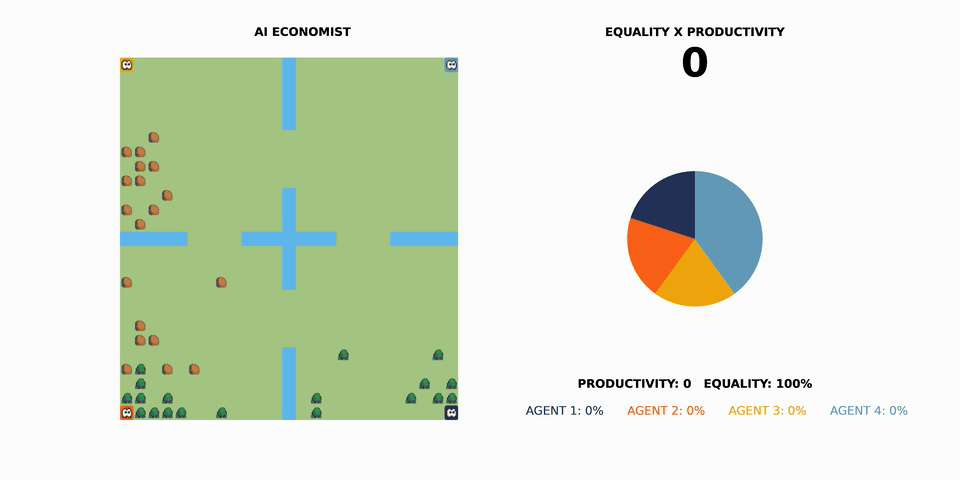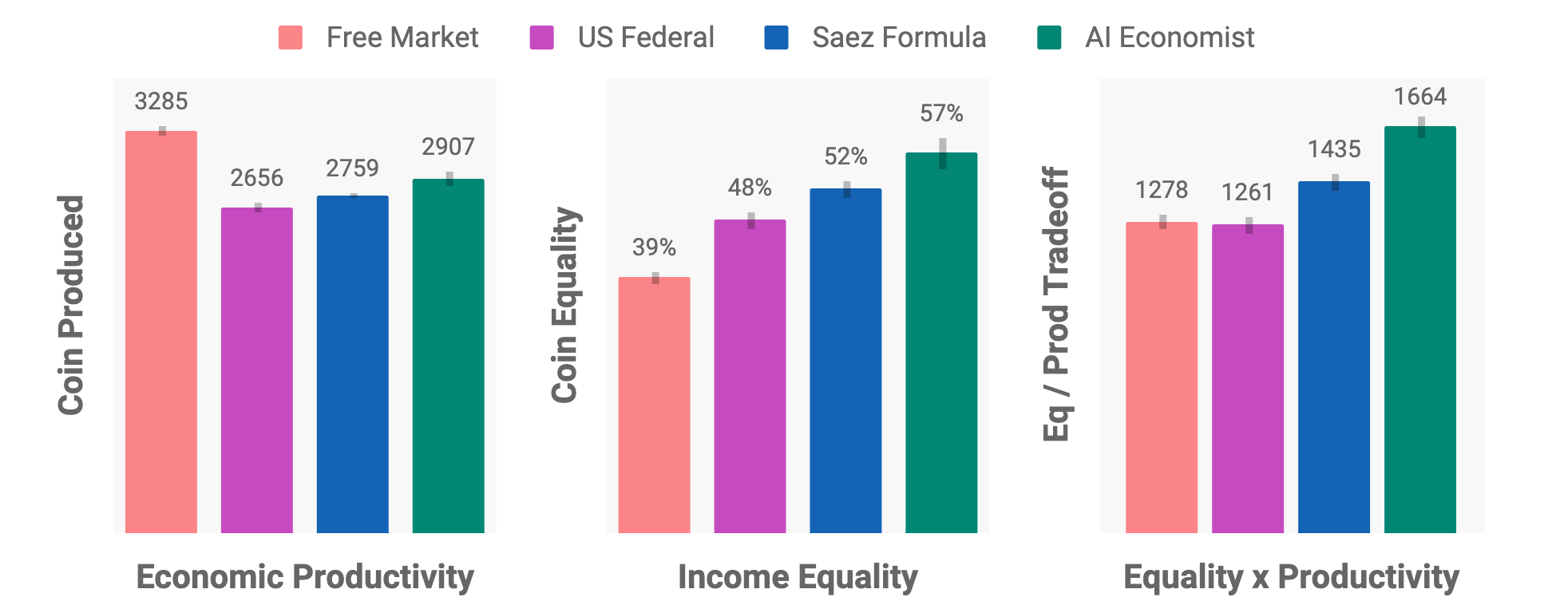政客常用手段_我可以比政客更好地管理经济
政客常用手段
The idea that the work of our elected representatives could be done better by a computer program would strike most sensible people as absurd. Managing the economy and all of its moving parts, for instance, is a herculean task for any government. Balancing the implementation of new policies with keeping a steady hand on the tiller is no easy feat, even with a legion of civil servants standing by to shower decision-makers with memos and white papers.
用计算机程序可以使我们当选代表的工作做得更好的想法会让大多数明智的人感到荒谬。 例如,对于任何政府来说,管理经济及其所有活动部分都是艰巨的任务。 要使新政策的实施与耕steady者保持平衡,这并非易事,即使有一大批公务员站在一边,用备忘录和白皮书为决策者提供支持。
On the other hand, just a few years ago, the idea that a computer program (an AI) could write poetry was absurd. Now, AI can write poetry good enough to fool reputable judges into thinking it must have been written by a human. You can add cancer diagnosis, theoretical mechanics and professional poker to the list of surprising areas where AI performance can surpass the humble homo sapien. A new initiative from Salesforce, an American software company, aims to add ‘economic policy’ to that list.
另一方面,仅仅几年前,计算机程序(AI)可以写诗的想法是荒谬的。 现在,人工智能可以写出足够好的诗来欺骗著名的法官,以为它一定是人类写的。 您可以将癌症诊断 , 理论机制和专业扑克添加到AI性能可以超越不起眼的智人的令人惊讶的领域列表中。 美国软件公司Salesforce的一项新计划旨在将“ 经济政策 ”添加到该清单中。
Stephen Zhang, the head of the ‘AI Economist’ research program, says that typical economic models relied on by economists and politicians suffer from serious challenges. To enable a controllable mathematical analysis, the models rely on assumptions. They might only focus on one policy lever in isolation (say, just GST rather than all taxes), and struggle to cope with large-scale shocks like that delivered by Covid-19. Most of all, economic models rely on the debunked notion of humans as tirelessly rational actors.
“人工智能经济学家”研究计划负责人史蒂芬·张(Stephen Zhang) 说 ,经济学家和政治家所依赖的典型经济模型面临着严峻的挑战。 为了进行可控的数学分析,模型依赖于假设。 他们可能只专注于孤立地使用一个政策杠杆(例如,仅征收商品及服务税而不是所有税项),并努力应对像Covid-19那样的大规模冲击。 最重要的是,经济模式依赖于人类作为孜孜不倦的理性行为者这一被揭穿的观念。
Zhang and Salesforce think that they can solve those issues with AI. Through a ‘reinforcement learning framework’, the Salesforce AI can develop effective economic policy without any recourse to economic models or existing theory. The AI does this by simulating the impact of different economic policies on an economy and observing the results. The AI is tasked with achieving different social outcomes and coming up with the optimal economic package that balances those objectives.
Zhang和Salesforce认为他们可以使用AI解决这些问题。 通过“强化学习框架”,Salesforce AI可以制定有效的经济政策,而无需依赖任何经济模型或现有理论。 AI通过模拟不同经济政策对经济的影响并观察结果来做到这一点。 人工智能的任务是实现不同的社会成果,并提出平衡这些目标的最佳经济方案。
The ‘reinforcement learning’ bit refers to the way their AI runs millions of simulations in the blink of an eye, each instance learning from what ‘worked’ in the last simulation. The AI is not given any prior knowledge about economic theory or policy whatsoever — it figures out what kind of policies to implement on its own, after observing simulation after simulation. You can think of it as though the AI starts from a blank slate where it can focus solely on results, unencumbered by decades of economic theory that usually dominate policy discussions.
“强化学习”指的是他们的AI眨眼间运行数百万次模拟的方式,每个实例都从上一次模拟中的“工作”中学习。 人工智能并没有获得任何有关经济理论或政策的先验知识,而是在观察模拟之后,找出可以自行实施哪种政策。 您可以将其视为仿佛AI从一开始就只能专注于结果的空白状态,而不受数十年来通常主导政策讨论的经济学理论的束缚。
An early iteration of the AI Economist was built for a scenario called ‘Gather and Build’. This scenario reflected a simple 2D economy, with different ‘agents’ collecting resources, earning money, and building houses. The AI could tax the workers however they liked, as well as redistribute money through welfare. The AI was tasked with maximising the productivity of the agents while minimising inequality (the agents had different skillsets, changing behaviours and tended to earn different amounts of money).
AI Economist的早期迭代是针对称为“聚集与构建”的场景构建的。 这种情况反映了简单的2D经济,不同的“代理商”收集资源,赚钱和建造房屋。 AI可以按他们喜欢的方式向工人征税,也可以通过福利来重新分配资金。 AI的任务是最大程度地提高代理人的生产力,同时最大程度地减少不平等现象(代理人具有不同的技能,不断变化的行为并往往获得不同的收入)。
Over countless simulations, the AI Economist trialled different combinations of taxation and welfare to work out the optimal balance. Just like in the real world, taxing agents too much dropped their productivity, but not taxing them meant that there wasn’t money to redistribute.
通过无数次模拟,AI经济学家尝试了税收和福利的不同组合以得出最佳平衡。 就像在现实世界中一样,向代理商征税太多会降低他们的生产力,但不向他们征税意味着没有钱可以重新分配。
The results of the reinforcement learning phase were impressive. At its conclusion, Salesforces’ AI had calculated the exact system of tax and welfare that would result in the highest combined score of productivity and equality.
强化学习阶段的结果令人印象深刻。 最终,Salesforces的AI已计算出准确的税收和福利制度,这将导致最高的生产率和平等得分。

As a comparison to the AI Economist, the research scientists ran the scenario under more orthodox systems of economic policy. These included a free market system with no taxation or redistribution, the American tax system, and a popular tax formula proposed by economist Emmanuel Saez. The AI Economist, despite beginning the scenarios with no pre-existing knowledge about tax theory or economics, outperformed all others in terms of maximising productivity and equality.
作为与AI经济学家的比较,研究科学家们在更传统的经济政策体系下运行了该情景。 其中包括没有税收或再分配的自由市场体系,美国税收体系以及经济学家伊曼纽尔·塞兹(Emmanuel Saez)提出的普遍税收公式。 人工智能经济学家尽管在开始时就没有关于税收理论或经济学的知识,但在最大程度提高生产率和平等方面却胜过其他所有经济学家。

While this is an encouraging start to AI economic policy, the simplified 2D scenario is clearly a pale imitation of the complicated mess that is the real economy. And of course, governments have more objectives to balance than just productivity and equality. However, the same reinforcement learning techniques that power the AI Economist could well lay the groundwork for a more complicated AI to manage all of the complications of the real world. Salesforce is optimistic that it can scale up their promising work.
虽然这是AI经济政策令人鼓舞的开始,但简化的2D场景显然是对实体经济这一复杂困境的淡淡模仿。 当然,政府要实现平衡的目标不仅仅是生产力和平等。 但是,支持AI经济学家的相同强化学习技术也可以为更复杂的AI处理现实世界的所有复杂情况奠定基础。 Salesforce乐观地认为它可以扩大他们有前途的工作 。
Given the radical potential of an AI better than humans at designing economic policy, it is worth thinking ahead of time about what the consequences might be for politics and government. While it is understandable to worry that delegating economic decisions to AI might result in an erosion of democracy, this doesn’t necessarily have to be the case. Remember that the AI isn’t deciding what outcomes (productivity, equality etc) are desirable, but which economic levers to pull to best achieve those goals. Arguably, voters might be freed up to focus on what they care about (outcomes) instead of needing to understand the minutiae of economic policy.
鉴于AI在设计经济政策方面具有比人类更好的巨大潜力,因此值得提前思考对政治和政府可能产生的影响。 尽管担心将经济决策下放给AI可能会导致民主的侵蚀是可以理解的,但事实并非一定如此。 请记住,人工智能并没有决定什么结果(生产力,平等等)是可取的,而是要决定采用哪种经济杠杆来最好地实现这些目标。 可以说,选民可能会腾出时间专注于他们关心的(结果),而不需要了解经济政策的细节。
For an example of this post-AI politics, parties could run campaigns on which priorities they would feed into the AI supercomputer. The Democrats might say they will task the AI with balancing productivity and redistribution. Republicans may campaign on a pledge to give the AI the freedom to do whatever it takes to maximise economic growth. The Greens would prioritise environmental protection over GDP. And so on. Whichever parties are successful in elections get to provide those priorities to the AI, which would accordingly set economic policy for the next three years.
作为这种AI后政治的例子,各方可以开展竞选活动,将优先级输入到AI超级计算机中。 民主党人可能会说,他们将在平衡生产力和再分配方面责成AI。 共和党人可能会誓言要让AI有做任何事情的自由,以最大程度地实现经济增长。 绿党将环境保护优先于GDP。 等等。 无论哪个政党在选举中取得成功,都可以将这些优先事项提供给认可机构,这将相应地制定未来三年的经济政策。
This is a radically different political landscape to imagine, but at the very least we would get more transparent politics on economic issues. Currently, all political parties campaign on delivering an economy that is “strong”, “fair”, and other bland epithets. Parties don’t even necessarily translate their campaign positions into policy if they form a government. Having an AI that converts the societal objectives it is set into economic policy would force parties to be a little clearer on what trade-offs they are willing to make in terms of their priorities.
可以想象,这是完全不同的政治格局,但至少在经济问题上,我们将获得更加透明的政治。 当前,所有政党都在为实现“强壮”,“公平”和其他平淡无奇的称谓的经济而运动。 如果政党组成政府,他们甚至不一定将其竞选职位转变为政策。 拥有将社会目标转化为经济政策的AI,将迫使各方在他们愿意根据优先级进行权衡的过程中弄清楚一点。
Whether or not we actually end up automating the country’s second-most important political position, AI will play an increasingly important role in helping governments craft policy. With the power and scale of well-designed AI, this trend should be welcomed as a step towards better government. However, a greater reliance on AI does raise a number of unique issues.
无论我们最终是否最终实现了该国第二重要的政治地位的自动化,人工智能在帮助政府制定政策方面将发挥越来越重要的作用。 凭借精心设计的AI的力量和规模,这一趋势应受到欢迎,这是朝着更好的政府迈出的一步。 但是,对AI的更大依赖确实引发了许多独特的问题。
First and foremost, the integrity of the AI frameworks and their data must be sacrosanct. Particularly if the country’s economic outcomes are at stake, the AI would have to be protected from hacking from the outside world and interference from insiders. Relatedly, the data that the AI processes must be free from the biases that plague far too many algorithms at present. AI engineers tend to be white and wealthy, and great care should be taken to ensure the AI has no unconscious tilt in favour of those same privileged groups. Existing economic policy does that quite enough as it is.
首先,AI框架及其数据的完整性必须是神圣不可侵犯的。 尤其是在危及该国的经济成果的情况下,必须保护AI免受来自外部世界的入侵和内部人员的干扰。 与此相关的是,AI处理的数据必须没有目前困扰着太多算法的偏见。 AI工程师往往是白人和有钱人,应格外小心,以确保AI不会无意识地倾向于那些相同的特权群体。 现有的经济政策足以做到这一点。
Finally, the AI would have to be ‘explainable’ — that is, the particular AI would have to be able to show the working behind its policy recommendations, so they can be cross-checked by experts. This is not an easy technical feat, as the reasoning of advanced AI is sometimes too complicated even for the AI’s creators to understand. However, handing over the economy to a mysterious and opaque AI is a dystopian nightmare.
最后,该AI必须是“可解释的”-也就是说,特定的AI必须能够显示其政策建议背后的工作,以便专家可以对其进行交叉检查。 这不是一项容易的技术壮举,因为高级AI的推理有时过于复杂,即使AI的创建者也无法理解。 但是,将经济交给神秘而又不透明的AI是反乌托邦的噩梦。
Partly due to these technical hurdles, no politician is at risk yet of needing to use their own unemployment scheme. But Salesforces’ AI Economist has trailblazed a path for AI policy design. An AI whose simulations can today be summarised with a 2D GIF might in a decade be able to simulate an entire economy, after absorbing all of the considerable data held by the government. Long before then, the very lodestar of ‘objective’ and ‘optimal’ governing should raise some welcome conversations about what it is exactly we seek from our representatives and the policies they pass.
部分由于这些技术障碍,没有政治人物处于需要使用自己的失业计划的风险中。 但是Salesforces的AI经济学家为AI政策设计开辟了一条道路。 如今,可以用2D GIF对模拟进行总结的AI在吸收政府持有的所有可观数据之后,可能在十年内就可以模拟整个经济。 在此之前很久,“客观”和“最佳”治理的极富争议性的话题应该引发一些关于我们从代表那里寻求的确切内容及其通过的政策的欢迎对话。
翻译自: https://towardsdatascience.com/could-ai-manage-the-economy-better-than-politicians-6b37c6f68190
政客常用手段
http://www.taodudu.cc/news/show-4625505.html
相关文章:
- 老码农回答为什么会有“在X有Y年的工作经验“这样的要求
- 720度全景带你vr云游景区,vr云游在景区的应用优势
- 阿里云块存储企业级特性之异步复制
- 云手机服务器解决方案
- 腾讯云数据库产品介绍第四章-
- 关于720全景视频在移动端播放的兼容问题汇总,截止2017年11月29日
- 阿里云标准型s6实例规格性能及应用场景
- 微擎安装之腾讯云懒人教程篇
- 阿里云oss(图片存储)--fastdfs (视频存储)
- python tkinter出牌洗牌
- 华为机试:连续出牌数量
- 出牌,用程序判断手中的牌是否能够压过对方出牌
- cocos2dx《单机斗地主》源码解剖之八 电脑玩家出牌与跟牌(结束)
- unity开发 斗地主算法—提示AI(提示出牌)
- 斗地主中自主出牌的游戏逻辑
- 跑得快—扑克牌游戏出牌规则(JavaScript)
- 斗地主老是输?Python教你做个自动出牌器,欢乐豆蹭蹭涨
- 纸牌游戏的牌型分析和出牌策略
- 【华为OD机试真题 JAVA】连续出牌数量
- 斗地主之出牌
- 麻将客户端出牌动作
- DFS+DP搜索斗地主玩家手牌最少出牌次数
- 斗地主滑动选牌出牌(Cocos Creator)
- 算法题:最少出牌次数
- 斗地主老是输?一起用Python做个自动出牌器,欢乐豆蹭蹭涨!
- 斗地主陪练机器人出牌算法使用说明
- 笨蛋!连0.2这么简单的数字都搞不定!你被炒了!
- 不定积分较难题
- excel数据选项卡中无从mysql导入数据/mysql for excel搞不定
- C++不定参数个数函数的写法
政客常用手段_我可以比政客更好地管理经济相关推荐
- 4、Ubuntu20常用操作_文本编辑文件系统目录和文件操作用户管理和文件权限
Ubuntu系统操作 注销(退出Linux系统) 在每次使用完后,一定要进行注销(或者说退出),以防他人通过你的帐号进入系统. 在Linux提示符下,运行exit命令,即可退出本次登录 或直接按组合键 ...
- java se好用吗_利用 Java SE 7 更好地管理资源
2011 年 5 月发布 作者:Julien Ponge 本文介绍 Java 7 针对自动资源管理问题给出的解决办法,即 Coin 项目中提出的新语言结构 try-with-resources 语句. ...
- chrome 内存管理机制_出色的Suspender可以更有效地管理Chrome的内存使用情况
chrome 内存管理机制 Chrome has built up quite a loyal following over the years, but while it is an adept w ...
- php开发面试题---攻击网站的常用手段有哪些,及如何预防(整理)
php开发面试题---攻击网站的常用手段有哪些,及如何预防(整理) 一.总结 一句话总结: 比较记忆:注意比较各种攻击的区别,比如csrf和xss,以及xss和sql,这样才能记住 1.Sql注入是什 ...
- python常用字符串格式化_Python字符串格式化常用手段及注意事项
Python字符串格式化常用手段及注意事项 格式化方式1: 使用f"" 使用示例 # -*- coding: utf-8 -*- # @Time : 2020/4/22 22:35 ...
- 三极管常用电路_三极管偏置电路
三极管常用电路_三极管偏置电路 1.三极管偏置电路_固定偏置电路 如上图为三极管常用电路中的固定偏置电路:Rb的作用是用来控制晶体管的基极电路Ib,Ib称为偏流,Rb称为偏流电阻或偏置电阻.改变Rb的 ...
- 五种经典上涨形态、主力低位骗筹和高位出货的常用手段
五种经典上涨形态 一.无意暴露试盘动作 股票经过一段时间的下跌,逐步开始有主力开始吃进.吃进的筹码第一步是用来砸盘的,主力利用大势不好的机会,不断抛售初期吃进的少许筹码,通常借助大盘大跌的机会,主动性 ...
- 计算机注册表管理,学会注册表几个常用的设置,更好地管理自己的电脑!
注册表是Windows操作系统的核心数据库,存放着各种参数,直接控制着Windows的启动.硬件驱动程序的装载以及一些Windows应用程序的运行.从Microsoft Windows 95操作系统开 ...
- 如何将常用的软件上传到ESXi本地存储中管理
一.如何将常用的软件上传到ESXi本地存储中管理 在使用虚拟机时,我们可能需要多个软件.比如部署操作系统需要CentOS或者Windows的镜像,再基于操作系统安装数据库可能有需要SQLServer. ...
最新文章
- JAVA基础学习day21--IO流三-File、Properties、PrintWriter与合并、分割流
- 用TWaver加载大型游戏场景一例
- MyBatisPlus的ActiveRecord实现CRUD
- 学习Netflix管理员–第2部分
- 【LeetCode】分类刷题 之 栈和队列
- WSDM2022 | 数据困境: 我们究竟有多了解推荐系统数据集?(附视频、论文及代码)...
- 等效全向辐射功率(EIRP)
- 原生JavaScript事件详解
- 12. URI , URN, URL 区别
- 思杰VDI外篇pvs安装
- windwos安装Android NDK(Native Development Kit)
- CSA发布云控制矩阵3.0版
- 常见的输入、输出、存储设备
- CMD连接MySQL,本地phpAdmin登陆
- 浅谈快件清关与邮关的区别
- 关于我遇到的一个DNS问题
- 小区公共广播系统设备接线_广播系统常见四种故障分析
- WinInet 和 WinHttp 有何区别?
- .net 应用服务GC时服务挂起几秒问题及解决办法
- php 隐藏默认的图片,php如何隐藏图片
